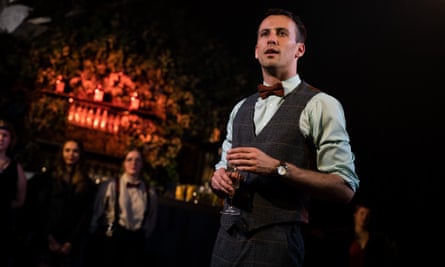With seven cast members, three understudies, 59 different ways to see the show unfold and more than 1,000 performances in four years, the Guild of Misrule’s The Great Gatsby has established itself as the longest-running immersive play in the UK. Each night, in a converted mansion block in central London, about 200 people pack in – often in roaring 20s fancy dress and most likely tipsy – to experience a two-and-a-half-hour production that lands somewhere between a Fitzgeraldian fantasy-scape and an office party.
What was still considered a left-field artistic proposition a decade ago, popularised by the likes of Punchdrunk and dreamthinkspeak, has become one of theatre’s biggest commercial money-makers. Now, dozens of events across the UK are riding on the immersive gravy train.
In Nottingham, punters can book into an experience called Flight that “will allow audience members to experience a plane crash”. In towns across England and Wales, customers can pay £55 each for a deliberately bad meal with Faulty Towers The Dining Experience.
In London alone, immersive-experience hunters can choose between Jeff Wayne’s The War of The Worlds, Mamma Mia! The Party, a murder mystery by way of The Invitation or hold tight for a limited run of 18 shows in May and June of Human Traffic Live: an “immersive rave theatre experience” based on a 90s film about clubbing, set in a cavernous nightclub and charging £300 for the pleasure of VIP tickets.
So, has the scene combusted and peaked?
“For some producers, it’s become a licence to print money,” says Andrzej Lukowski, theatre editor for Time Out. “It’s a party night and infantilised. It’s not attempting to be high art or progressive. Theatre as an art form often tries to do something excellent and reaches for the stars even when it fails, but this current crop of immersive shows have to make money. You don’t see them striving for brilliance or pushing boundaries or doing anything genuinely meaningful.”
It is a view shared by Lois Keidan, director and co-founder of Live Art Development Agency, who helped pioneer immersive theatre as an art form decades ago through influential artists such as Adrian Howells and Geraldine Pilgrim. “There is a provenance that is overlooked, where artists have taken risks and tested the form over years. Now, the experience economy has swallowed that and appropriated it for commercial gain – but that’s always the way, of course.” Why does she think the immersive industry is booming now? “Well, it’s become part of the entertainment industry,” she says. “And it’s cheaper than building a new ride at Alton Towers.”

Yet audiences are clearly enthralled. Secret Cinema, which recreates favourite films as “worlds” where the audiences dress up as characters from Blade Runner, Back to the Future and so on, has become one of the most successful immersive franchises in the world. Last week, the company signed a major deal with Disney to bring its classic films to life.
Brian Hook and Louis Hartshorn, the producers of Gatsby, The Wolf of Wall Street (which closed last month) and an upcoming immersive Doctor Who, say they have helped democratise the genre. “We have people coming that wouldn’t necessarily go to a West End show. We’re competing against crazy golf and escape rooms, things that people go to do as well as see,” says Hartshorn.
“We originally wanted to make The Beautiful and Damned,” adds Hook, “but we felt like I couldn’t sell tickets to it – it’s not in the public mood in the same way. With a cool, hipster version of Gatsby, with the Leonardo DiCaprio film in the zeitgeist, we have been able to draw in a huge spread of experience seekers – from hen dos to school groups.”
The industry is still grappling with safeguarding performers. Judging by complaints of groping and sexual misconduct in shows from Punchdrunk’s Sleep No More to Gatsby, actors may be more vulnerable to abuse when the traditional boundaries between them and the audience are breached. For their production of The Wolf of Wall Street, Hook and Hartshorn ensured the cast were equipped with personal alarm buttons.
Still, both agree that the immersive-experience scene has only just got going and predict explosive growth in 2020. To that end, they have invested heavily in their own three-storey Mayfair venue dedicated to “developing and staging theatre-led immersive experiences”.
“At the moment, the problem is that a lot of different work is lumped under the immersive banner,” says Hartshorn. “Maybe we need different names for different genres within it.”
On this point, Lukowski agrees. “The fact that it wants to be called theatre is interesting,” he says. “It’s light interaction, drinks at the bar and a middlebrow party night. But that’s fine. If they were taking up a West End theatre you might quibble, but they’re often making use of abandoned buildings. It’s just disappointing that a lot of shows don’t have very high artistic aspirations.”
